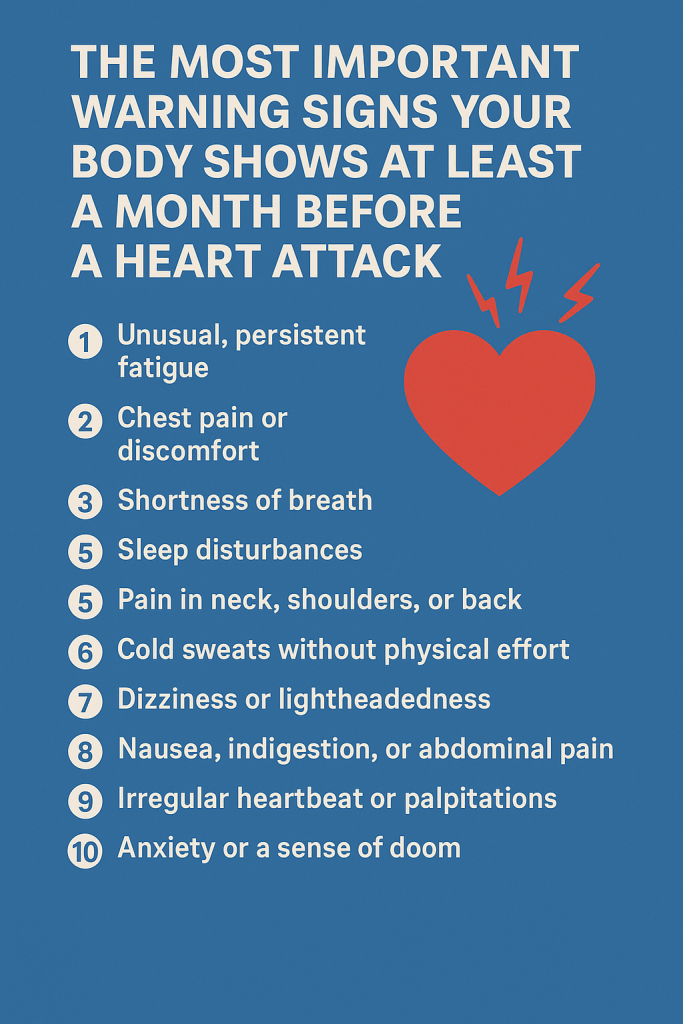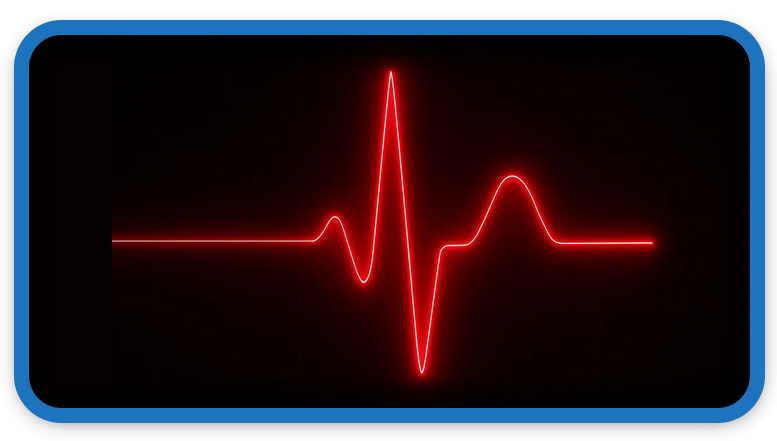⏲️ Estimated reading time: 4 min
🔹 Signs of a Heart Attack One Month in Advance. 🔹 Your body often sends warning signals well before a heart attack strikes. Recognizing these signs at least a month in advance can give you time to act, seek help, and potentially save your life or someone else’s.
The Most Important Warning Signs Your Body Sends at Least a Month Before a Heart Attack
A heart attack rarely happens without warning. In many cases, your body will give you signals weeks or even a month in advance. Learning to recognize these early signs can be the difference between life and death.
Let’s explore the most common and important symptoms that may signal an upcoming heart attack.
1. Unusual, Persistent Fatigue
Fatigue is common, but when it becomes extreme, appears suddenly, or doesn’t go away with rest, it may signal trouble. This symptom is particularly frequent in women. It may be a result of reduced oxygen supply to the muscles and vital organs due to poor heart function.
2. Chest Pain or Discomfort
Chest pain is the most recognized heart attack warning sign. It can feel like pressure, tightness, burning, or a squeezing sensation in the center of the chest. This pain might be constant or come and go over several days or weeks.
3. Shortness of Breath
If you find yourself breathless during daily activities or even at rest, your heart may not be pumping effectively. This can lead to fluid buildup in the lungs and should never be ignored. Many mistake it for anxiety or asthma, but it can be cardiac in nature.
4. Sleep Disturbances
Difficulty sleeping, waking frequently, trouble falling asleep, or waking up gasping for air may be early signs of a heart issue. These sleep disturbances can stem from poor oxygen circulation and increased nervous system stress caused by cardiac dysfunction.

5. Pain in Neck, Shoulders, or Back
Pain that radiates to the neck, shoulders, jaw, or upper back especially without a physical cause can indicate a heart problem. This type of discomfort often gets dismissed as muscle strain or tension but can be cardiac-related.
6. Cold Sweats Without Physical Effort
Waking up drenched in sweat or experiencing sudden cold sweats for no clear reason can indicate your nervous system is responding to internal stress. This is one of the more overlooked early warning signs of a heart attack.
7. Dizziness or Lightheadedness
A reduction in blood flow to the brain can lead to dizziness, imbalance, or fainting. These symptoms are often dismissed, but if persistent, especially combined with chest pain or fatigue, they may indicate an approaching heart event.
8. Nausea, Indigestion, or Abdominal Pain
Some individuals experience stomach pain, nausea, or a bloated feeling that mimics indigestion. These symptoms are more common in women and may be caused by reduced blood flow to the digestive tract.
9. Irregular Heartbeat or Palpitations
Feeling like your heart is racing, skipping beats, or pounding abnormally can indicate arrhythmia or other heart issues. While occasional palpitations can be harmless, frequent or sudden episodes may point to a serious underlying condition.
10. Anxiety or a Sense of Doom
Many heart attack survivors report a strong, inexplicable feeling that something bad is about to happen. This sense of anxiety or dread can appear without any logical cause and may be your brain reacting to signals from the heart.
What to Do If You Notice These Signs?
If you experience one or more of the above symptoms especially if they persist or combine do not wait for them to pass.
Take action:
- Seek medical attention immediately. Even if you’re unsure, it’s better to be safe.
- Get an EKG and blood tests to assess your heart function.
- Reduce stress and avoid physical strain.
- Monitor your blood pressure and pulse regularly.
- Don’t self-medicate or ignore the signs.
How to Prevent a Heart Attack
Prevention can save your life. Adopt a heart-healthy lifestyle with these essential habits:
- Eat a balanced diet rich in vegetables, lean proteins, whole grains, and healthy fats.
- Exercise regularly at least 30 minutes of walking or light activity daily.
- Quit smoking and limit alcohol consumption.
- Manage chronic conditions like diabetes, hypertension, and high cholesterol.
- Schedule regular checkups, especially if you have a family history of heart disease.
💡 Final Thoughts
Your body whispers before it screams. A heart attack doesn’t usually come out of nowhere it builds up quietly. Pay attention to your body’s messages. A quick checkup or a lifestyle adjustment today might save your life tomorrow.
Stay informed, alert, alive.
🔔For more tutorials like this, consider subscribing to our blog.
📩 Do you have questions or suggestions? Leave a comment or contact us!
🏷️ Tags: heart attack, early symptoms, warning signs, heart health, cardiac arrest, chest pain, fatigue, indigestion, irregular heartbeat, medical tips
📢 Hashtags: #heartattack, #healthwarning, #earlysymptoms, #chestpain, #fatigue, #cardiachealth, #heartcare, #preventivecare, #healthtips, #medicaladvice
Only logged-in users can submit reports.
Discover more from HelpZone
Subscribe to get the latest posts sent to your email.

